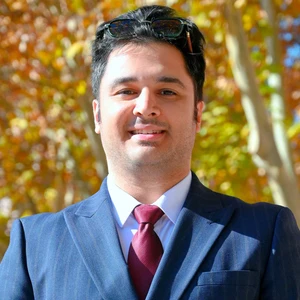News
Ukraine claims drone strike on oil refinery in Russia Video shows a massive explosion at a Russian oil facility in Novokuybyshevsk, 1,000km from the Ukrainian border. Ukraine’s military says it used drones to target several sites inside Russia, including refineries, an airfield, and an electronics plant.
Publications
The Limits of Pragmatic Intentions: The Evolving Story of China-India Rapprochement  By Shanthie Mariet D’SOUZA, PhD, founder & president, Mantraya Institute for Strategic Studies (MISS)
By Shanthie Mariet D’SOUZA, PhD, founder & president, Mantraya Institute for Strategic Studies (MISS)
While the intention to reset China-India bilateral relations seems real, both the drivers and the outcomes need a careful analysis.
We live in a world of constant flux. Nations, over time, discover a variety of reasons – geopolitical or otherwise – to become friends or foes, based on their national interests. China-India relations aren’t immune from this truism. The trend in the past decade has seen the two neighbours embracing each other and then falling out. And after years of bickering and contestation, the time has come again for them to explore yet another round of engagement. Is the current rapprochement merely opportunistic and temporary? Or is it geared toward a long-term solution of their contestations driven by extraneous factors and geopolitical uncertainty?
On July 23, the 34th meeting of the Working Mechanism for Consultation and Coordination on China-India Border Affairs took place in New Delhi. The meeting discussed issues relating to strengthening border management and maintaining calm along their contested border. More concrete discussions on the “boundary question” are expected to be held when the special representatives of both countries meet for the 24th time later this year. READ MORE
Publications
Armenia and Azerbaijan have taken a new route in their quest for peace

 By Benyamin POGHOSYAN, PhD, Senior Research Fellow at the APRI Armenia
By Benyamin POGHOSYAN, PhD, Senior Research Fellow at the APRI Armenia
Lara SETRAKIAN, President, APRI Armenia
Political scientists and wider civil society from Armenia and Azerbaijan don’t often see eye to eye. After decades of war between the two countries their grievances run deep, with each side blaming the other for continued rounds of conflict. But experts in Yerevan and Baku can now agree on one thing: the meeting held in Abu Dhabi on July 10 between their heads of government was a moment of respite for the South Caucasus. After months without a major meeting between the two sides (the leaders met briefly at the margins of the European Political Community summit in Tirana in May), Abu Dhabi was able to host their most comprehensive gathering in known history, attended by representatives who cover all key aspects of the Armenia-Azerbaijan peace process. Still, expectations should be managed. The two sides may yet be very far from signing a peace agreement, though a draft was announced earlier this year. There are thorny issues, like border demarcation, that remain unresolved. And there are competing visions for how the future of transport links should evolve. Nonetheless, the Abu Dhabi meeting has revived the diplomatic track, giving new hope for peace and stability, while calming fears of an imminent outbreak of war.
READ MORE
Publications
Abu Dhabi Summit Reignites Progress on Zangezur Corridor  By Vusal GULIYEV, Policy Advisor at the Center of Analysis of International Relations and Head of Shanghai Office at AZEGLOB Consulting Group
By Vusal GULIYEV, Policy Advisor at the Center of Analysis of International Relations and Head of Shanghai Office at AZEGLOB Consulting Group
The July 10 meeting in Abu Dhabi between Azerbaijani President Ilham Aliyev and Armenian Prime Minister Nikol Pashinyan has reinvigorated discussions on the long-sought Zangezur Corridor. Hosted by the United Arab Emirates as a neutral venue, the summit marked the first direct bilateral talks between the two leaders without mediators—a notable development given Russia’s traditional role in the South Caucasus peace process. While no final peace accord was signed, the talks were described as constructive, with extensive discussions on key sticking points, foremost among them the opening and development of the Zangezur Corridor. This 43-kilometer-long (around 26-mile-long) corridor—a proposed land route through Armenia’s Syunik province—is designed to link mainland Azerbaijan to its Nakhchivan exclave and then proceed onward to Türkiye. While short on immediate breakthroughs, the Abu Dhabi summit’s outcomes have nevertheless revived prospects for the corridor’s realization, notably by reaffirming a bilateral, results-oriented negotiation format and entertaining new ideas for its governance and security. READ MORE
Publications
Israel War Erodes Iran’s Relations with Azerbaijan
 By Fuad Shahbazov, Baku-based independent regional security and defence analyst
By Fuad Shahbazov, Baku-based independent regional security and defence analyst
The 12-day Israel-Iran war revealed new vulnerabilities in the Islamic Republic and increased tensions between Iran and its neighbour, Azerbaijan. In the aftermath of the strategic setback to Iranian nuclear and military facilities, Iran’s conservative political and security establishment began shifting focus toward perceived “close enemies” said to be complicit in the Israeli attacks. Among the primary targets of this narrative has been Iran’s northern neighbor, Azerbaijan, which Iranian state-run media and channels affiliated with the Islamic Revolutionary Guard Corps (IRGC) accused of providing “intelligence support to Israel” during the strikes on nuclear, military, and civilian sites. While Azerbaijani officials categorically denied any involvement in Israeli military operations and the Iranian government did not present concrete evidence supporting its claims, the media campaign renewed tensions between Tehran and Baku, undermining a period of cautious diplomatic stability that had followed earlier disputes over Armenia and other issues. Indeed, the Iranian criticism of a growing Azerbaijan-Israel alliance is not a new phenomenon and Azerbaijan’s ties with Israel have long been a source of discontent in Azerbaijan-Iran relations. READ MORE